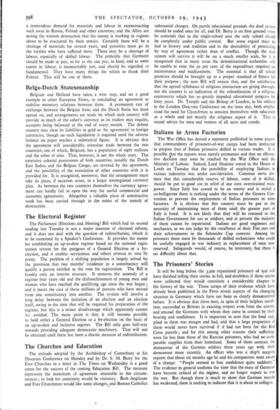The Prisoners' Stories
It will be long before the 3,500 repatriated' prisoners of war will have finished telling their stories in full, and doubtless if those stories were collected they would constitute a considerable chapter in the history of the war. Those scraps of their evidence which have already been published in the Press reveal aspects of the changing situation in Germany which have not been so clearly demonstrated before. It is obvious that these men, in spite of their helpless condi- tion, succeeded as Britons in exacting respect even from the enemy, and-amazed the Germans with whom they came in contact by their bearing and confidence. It is important to note that the food sup- plied to them was meagre and bad, and that a large proportion of them would never have survived if it had not been for the Red Cross parcels ; and for this among other reasons their sufferings were far less than those of the Russian prisoners, who had no com- parable supplies from, their homeland. Some of • them contrast the demeanour of the German soldiers three years ago with their demeanour more recently. An officer who was a ship's surgeon reports that about six months ago he and his companions were aware of a change. "People seemed to lose confidence quite suddenly." The evidence in general confirms the view that the mass of Germans have• become critical of the rigime, and no longer expect to win the war. But though there is much to show that German morale has weakened, there is nothing to indicate that it is about to collapse.


























 Previous page
Previous page